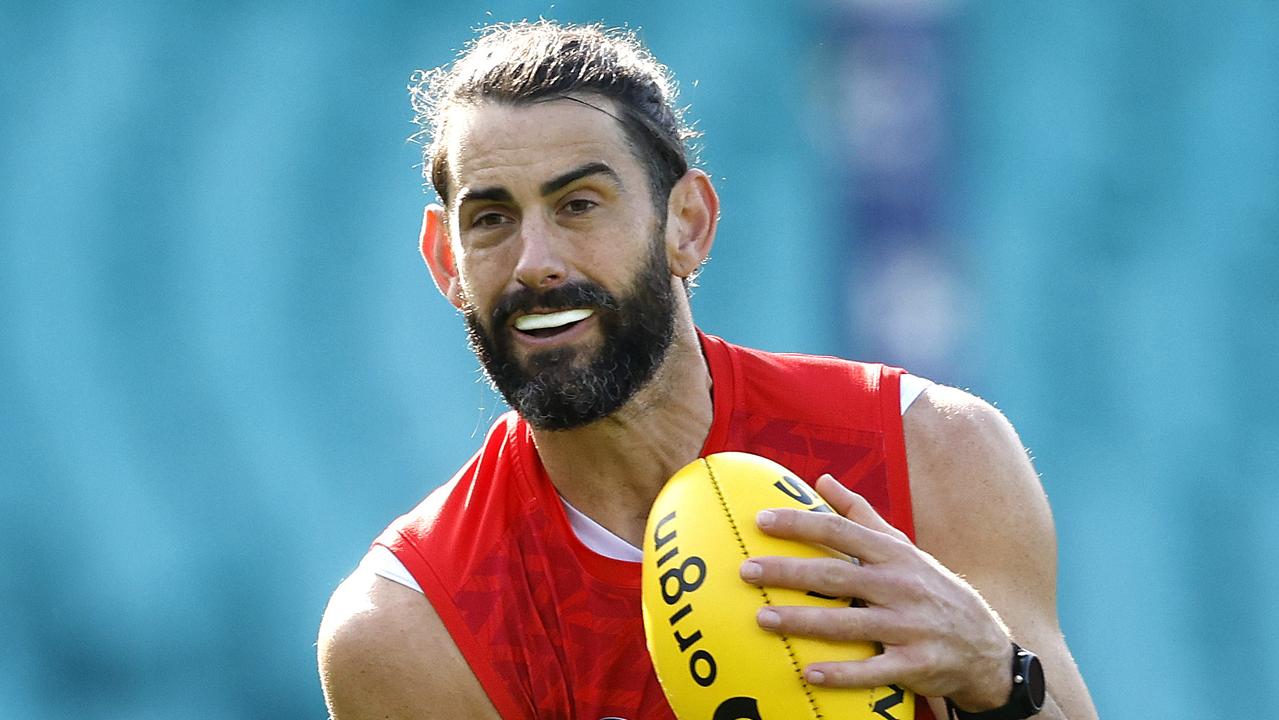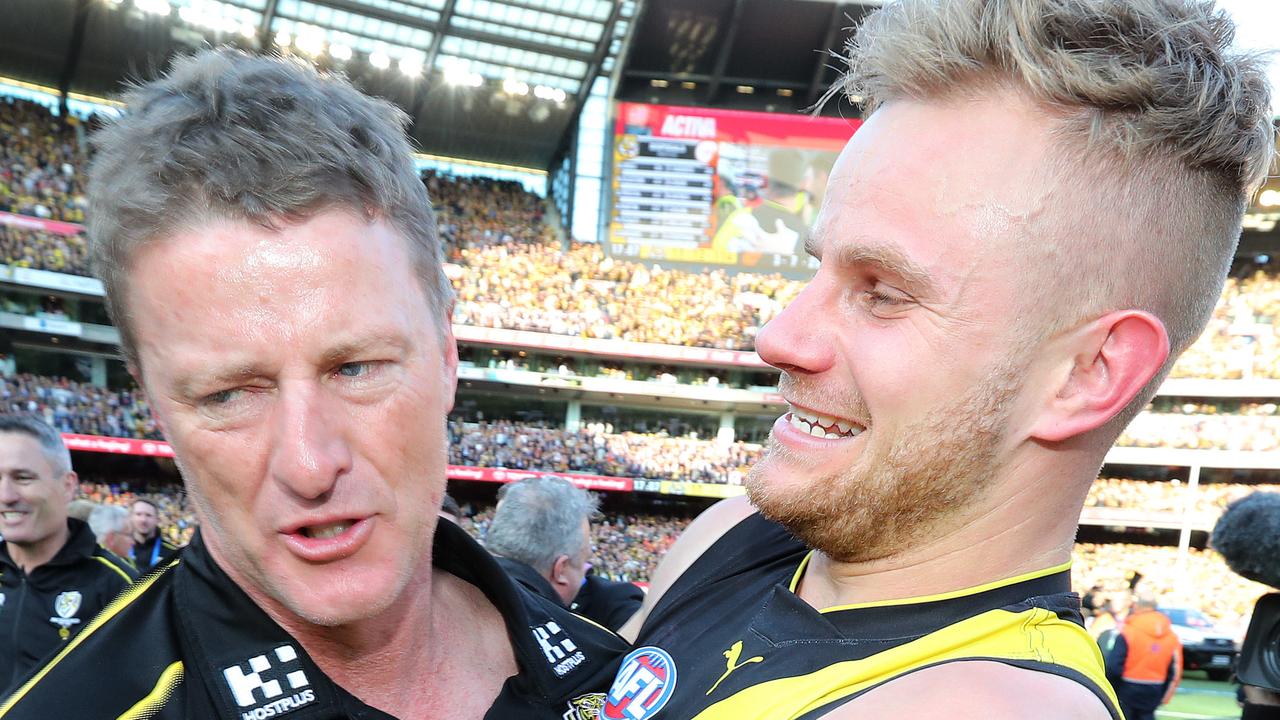Australian Football Hall of Fame 2024: South Australians Chris McDermott and Michael Graham
Inaugural Crows skipper Chris McDermott and Sturt great Michael Graham have been inducted into the Australian Football Hall of Fame. And while their paths were very different, they both changed along the way.
AFL
Don't miss out on the headlines from AFL. Followed categories will be added to My News.
Diving on a footy in a pre-season match at a coastal resort set Chris McDermott on the path to becoming an Australian Football Hall of Famer.
McDermott could not recall an in-and-under approach being part of his play until that moment.
But his desperation as a 17-year-old in February 1981 in his first trial game for Glenelg impressed the Tigers’ senior coach, ex-Sturt champion John Halbert.
“I fell on a footy in the first quarter … at Wirrina holiday resort and it was a ball-up,” McDermott recalled.
“I don’t reckon Jack (Halbert) knew my name, somebody must have told him, but he said ‘young McDermott, if you do that you’ll play for me every week’.
“That stuck in my head … so I built a career on doing exactly that.”
McDermott went on to play 277 games for Glenelg from 1981-90 and 1995-96, 117 for the Crows from 1991-96 and 15 for the state.
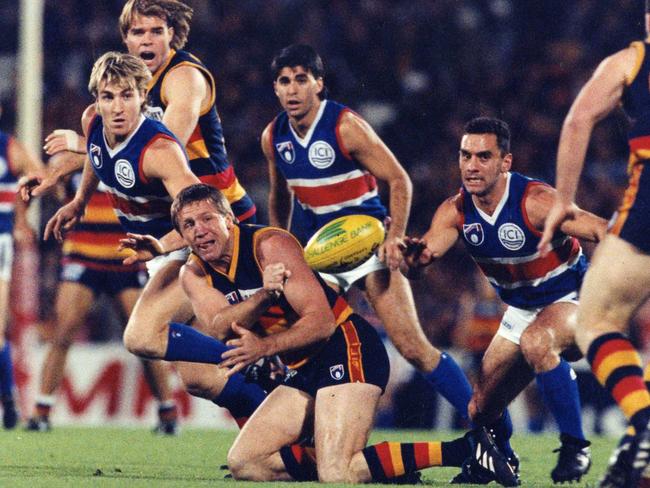
He won two SANFL premierships (1985, 1986), four best-and-fairests (1986-88 at Glenelg, 1992 with Adelaide) and was a three-time All-Australian (1986, 1987, 1992), earning
a reputation as one of South Australia’s toughest and most courageous players.
“I wasn’t fast, I couldn’t kick very well, my reflexes and hands were a strength and so was my ability to win the ball,” the former Glenelg, Crows and state captain said.
“I enjoyed the collision part of the game, the warrior part of the game.
“The punishment was the beauty for me.
“It was what the game was based on and the era suited me.”
McDermott’s football contribution was recognised with his induction into the national hall of fame in Melbourne on Tuesday night.
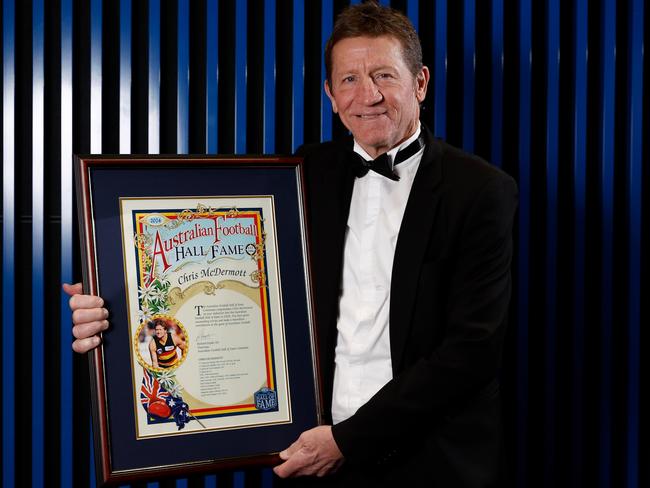
His love of the game developed from being in a freezing Woodville change room in 1969 as a five-year-old with his grandfather, Les Dayman.
“Bro” Dayman was a Port Adelaide great who became a Peckers official.
McDermott would tag along to matches.
“I was a Woodville tragic – everything was green and yellow,” he said.
Soon, McDermott was wearing yellow and black after his family moved to Marino in the Glenelg zone and joined the Tigers’ under-10s.
Family tragedy shaped his football.
His parents, Brian and Helen, died from cancer within about six months of each other when McDermott was 15.
“My folks took me everywhere, my Dad assistant coached everywhere, including Seacliff Primary, where Murray Weideman was our coach,” he said.
“Dad was really hands-on and Mum was enormous.
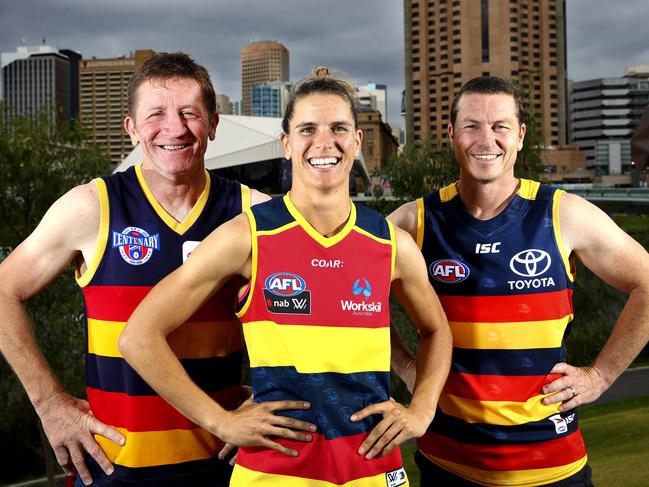
“The sacrifices she made and help she gave me when she should’ve been looking after herself, she ran me everywhere so I never missed a practice, never missed a game.”
Remembering his parents became a personal, pre-game ritual.
McDermott would take a moment by himself – usually in a toilet cubicle – to reflect.
“It was like going to confession,” he said.
“It just got me in the right headspace to go out and play the way I played.
“For two hours, I sort of thought I was bulletproof and thought I couldn’t be hurt.”
It took until Graham Cornes became Glenelg’s coach in 1985 for McDermott to feel like he belonged at SANFL level.
He had “reasonable” debut season under Halbert, was “brought back to earth a bit” in his second year then struggled in 1983-84 under coach Graham Campbell.
“We had a lot of young blokes – that was the era of Tony Symonds, Gavan Walsh, Chris Duthy, Peter Maynard, Stephen Kernahan and Tony McGuinness, and we dubbed ourselves ‘the Magnificent Seven’ – and we loved playing, but enjoyed ourselves,” he said.
“It took for Graham Cornes to come in, focus on discipline and physical fitness … for us to realise ‘hang on, we’ve got something good here at a footy club that’s underachieved for so long and we owe it to ourselves, our supporters and our club to do something about it’.
“So Graham’s got to get a lot of credit for being able to rally the troops and get us focused.”
It culminated in back-to-back premierships.
McDermott said the 1985 flag – a 57-point win over North Adelaide that ended Glenelg’s 12-year drought – “meant everything”.
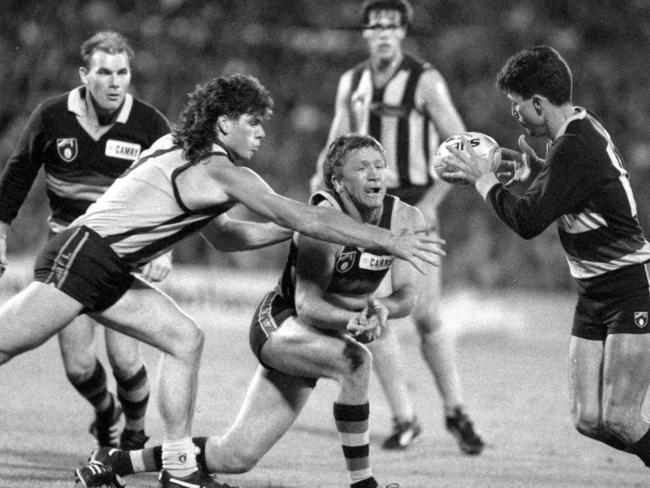
The Tigers backed it up by beating the Roosters again the next year by 58 points.
“We’d lost two superstars (McGuinness and Kernahan) to the VFL … but there was an internal drive where we said ‘that’s what we were last year, not who we are this year’,” McDermott said.
McDermott remained loyal to the Tigers despite several interstate clubs chasing him.
He visited Fitzroy, Carlton tried to lure him to help get his great mate Kernahan and Brisbane drafted him at pick 2 in 1987.
“It never got to a really serious decision because it was so easy to stay,” he said.
“I loved Glenelg more than anything and my brother and sister were here, so those family ties, given what had happened, were really strong.”
McDermott was eventually lured to another club.
He was working at Rowe and Jarman sports store when Cornes, Neil Kerley and Bob Hammond asked him to become Adelaide’s first skipper for its 1991 AFL entry.
“If there was anything that was going to break me out of that Glenelg love and family, it was this,” he said.
“It felt like state footy 22 games a year.”
McDermott’s memories of the Crows’ debut – an 86-point triumph over Hawthorn – were only of addressing the players before stepping onto Football Park and hearing singing from the medical rooms post-match.
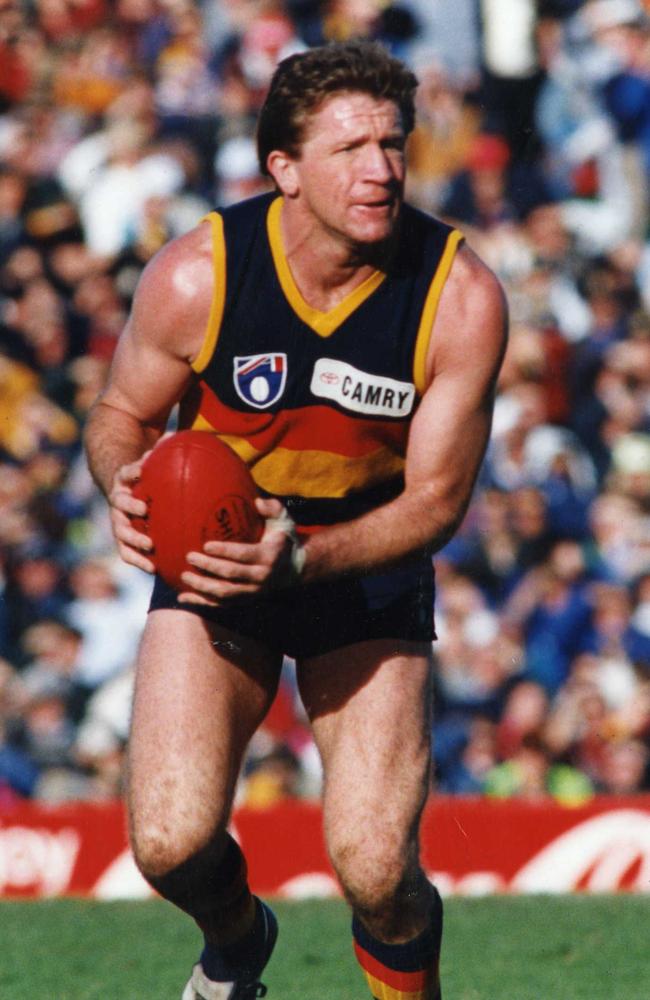
A brutal bump from Hawks star Dermott Brereton knocked the then 27-year-old out.
“I told the players at the top of the race what a big step we were about to take, the magnitude of the game and that people would be talking about it in 30, 40 years time,” he said.
“Understand it, respect it and play like your life depends on it.”
McDermott described his time with the Crows as a great ride.
“It was hard yakka, there were highs, lows, building a club, dealing with adversity and it was never dull,” he said.
“After making the 1993 preliminary final, we got to the airport and there were thousands of people there, it coincided with Modra mania – the joy that it brought the state made it surreal in a certain way.”
When Adelaide achieved the ultimate success – in 1997-98 – McDermott missed out after being axed by new coach Malcolm Blight after the 1996 campaign.
“I was probably grumpier than I should’ve been at the time, but I was really happy for the boys and guys like Bicks (Mark Bickley), Roo (Mark Ricciuto) and Benny (Ben Hart),” he said.
Football introduced McDermott to another passion – raising money for ill children.
During the early days of the Crows, he and McGuinness met Nathan McLean and Nicholas Berry, who were battling a brain tumour and kidney cancer respectively.
What followed was the creation of the Little Heroes Foundation, previously the McGuinness McDermott Foundation.
“The friendships ended in tragedy, but Nath opened my eyes to something that I’d had my head in the ground about for 20 years since my parents had died,” McDermott, the foundation’s chairman, said.
For the man nicknamed “Bone”, Tuesday night’s induction was largely about family.
“They’re the ones that don’t get acknowledged enough during your career, it’s your team, your mates, your coach, your supporters, your sponsors,” said McDermott, who was full of praise for his wife Jo, their 18-year-old twins Harper and Fraser, his brother Mark and sister Jane.
“In front of such an illustrious audience, I get the chance to say thank you.”
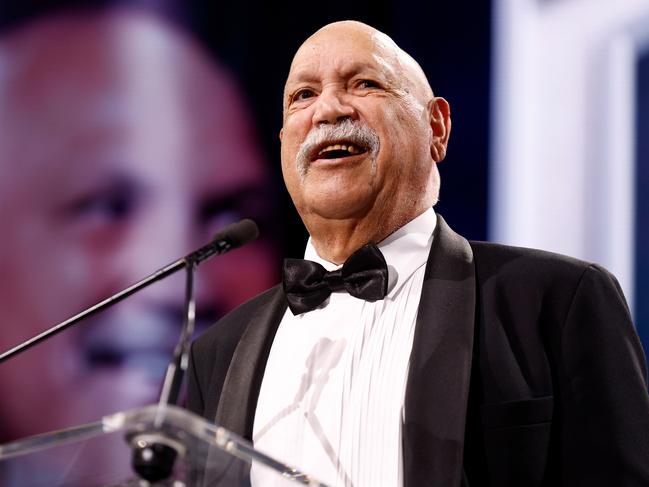
UP IN A FLASH: THE DECISION THAT CHANGED STURT GREAT’S LIFE
– Scott Gullan
They called him “The Flash”, the fastest player to have ever worn Sturt’s double blue guernsey and Michael Graham has an interesting theory to how he got his renowned speed.
Graham was one of 11 siblings so when someone was up to mischief, which was fairly regular, and their father was on the warpath, being the quickest on their feet was an important advantage.
“I know where I got my pace from,” Graham says. “I was always the first one under the bed when we got in trouble and then all the other boys come in and I’m protected.”
Graham was born in Wallaroo in South Australia before the family moved to Penola, the winegrowing area in the state’s southeast. He grew up watching his brothers play football and at the age of 18 he won the league best and fairest playing for the Penola Eagles.
That was where he was noticed by legendary Sturt coach Jack Oatey and general manager Vic O’Donnell who asked Graham to move to Adelaide to play football.
His parents, Cecil and Doris, then moved the whole family to Adelaide, settling in the outer suburb of Elizabeth, to support their second youngest son’s football career.
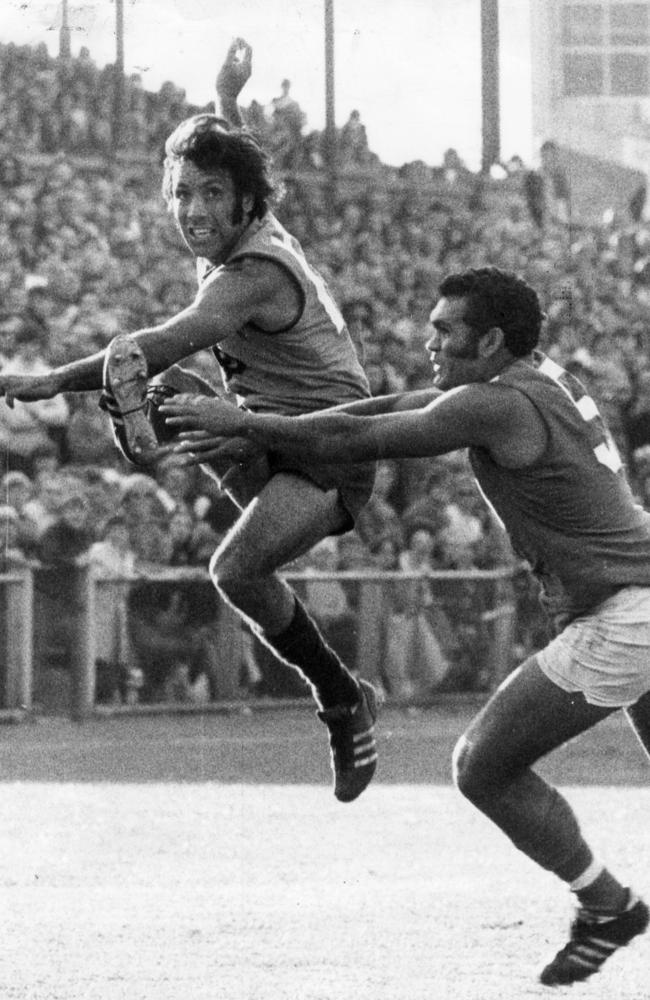
“It was a bit daunting in Adelaide at first being a country bumpkin who was used to chasing rabbits and that sort of stuff,” Graham said.
“So I had to catch a train from Elizabeth all the way to Adelaide to train and all the way back, I did that for a few years and my parents were the main reason I stayed in footy, they were a great support.
“I had to adjust quickly to Adelaide life. Outside of footy you had to go out with the boys on a Saturday night, it was all a new life experience for me.”
He adapted quickly, being the runner-up in the Magarey Medal in 1973 before he made a decision which would change the direction of his life.
His younger brother Cecil had gone up to Darwin to play football and convinced Michael he should come with him over the summer months when he wasn’t playing with Sturt.
“I got permission from Jack (Oatey) to go up there and it was the best thing I ever did,” he says.
“I really enjoyed it up there, I was getting fit in Darwin (by playing) and then coming back match fit.”
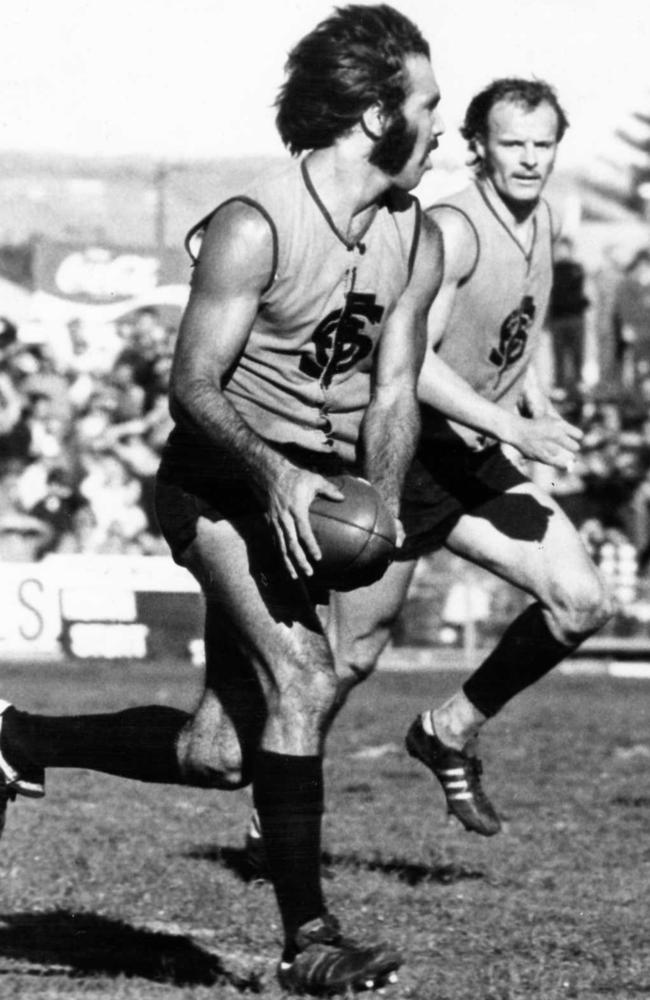
He joined St Mary’s Football Club and in his first season won the Nichols Medal, the NTFL’s highest individual player award along with his club’s best and fairest award.
And so started an incredible pattern of success, both team and individually, with Graham dominating both competitions.
He won premierships with Sturt in 1974 and 1976, played 282 games, kicked 455 goals and represented South Australian 11 times while in Darwin he played in St Mary’s premierships in 1978/79, 1983/84 and 1985/86.
At one stage Graham thought he was going to play with Melbourne in the VFL after being brought down for a trial.
“I flew down from Darwin to Melbourne, trained with Melbourne for the week and then went back to Darwin,” Graham said. “But then there was no more communication. I was thinking I would go back to Melbourne but instead I went back to Sturt.
“My nephew made up for it though, Colin Graham, he played for Melbourne.”
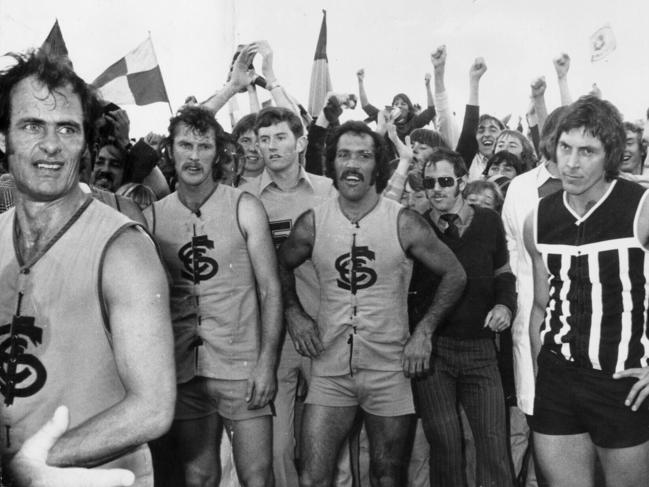
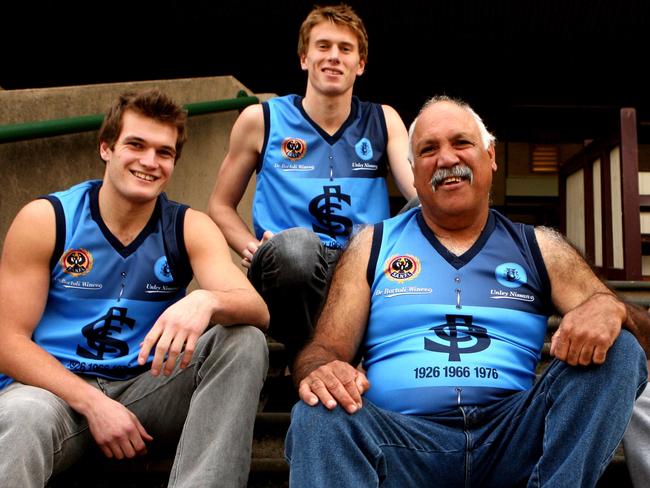
Graham played with and against some famous football names from the Long and Rioli families and says he gets great enjoyment from watching the AFL’s current generation of Indigenous stars.
“It’s amazing to see how they play their footy now and I’m amazed at their skills,” he says. “(Eddie) Betters the way he used to kick goals, Buddy Franklin kicking all those goals, Michael O’Loughlin, Gavin Wanganeen, Adam Goodes, they’re all from my country in the Yorke Peninsula.
“I’ve always admired Andrew McLeod, he was a great footballer and now Tyson Stengle, quick little players like that remind me a lot of me with their football brain.”
Graham ended up settling in the Northern Territory where he coached the Darwin Buffaloes and Waratah and never officially retired from playing.
At the age of 50 in 2003 he played in Alice Springs where he won the league’s reserve grade goal kicking award.
To this day ‘The Flash’ won’t concede he’s played his last game of football. He has been a regular at Super Rules carnivals with a foot injury in recent years holding him back.
“My body is still pretty good, a couple of heart attacks and a hip replacement, but I’ve been trying to play Super Rules for the last two years,” he said.
“I think 2017 was the last time I played but I have been training although I have had this foot thing which has been a problem.
“The thing is I just love footy and have ever since I was a little fella.”
More Coverage
Originally published as Australian Football Hall of Fame 2024: South Australians Chris McDermott and Michael Graham



